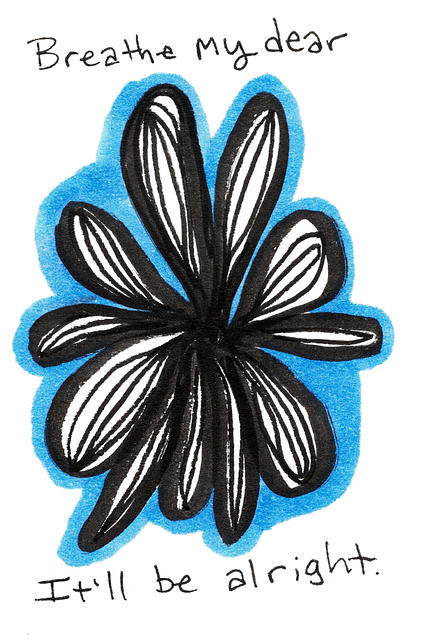Mental wellness group facilitation offers specialized support for individuals with sexual addiction, creating safe spaces for sharing, peer learning, and coping strategy development. Facilitators encourage open dialogue, helping members navigate emotions, break stigma, and explore recovery paths including stress reduction. This approach enhances self-awareness, builds resilience, promotes healthy relationships, and prevents burnout, significantly improving overall well-being. Effective communication, active listening, and non-judgmental language are key to creating a supportive environment, breaking barriers, and challenging stigma in therapy for sexual addiction. Techniques like reflective feedback and collaborative ground rules further enhance safety, enabling risk management planning and collective coping strategy development. Interactive activities boost engagement, fostering connections, emotional healing, and mental illness stigma reduction in a safe, non-judgmental setting.
Mental wellness group facilitation plays a pivotal role in supporting individuals navigating various challenges, with a focus on sexual addiction being a prominent issue. This article explores effective techniques for facilitators, offering insights into enhancing therapy sessions. We delve into understanding mental wellness dynamics, the specific needs of sexual addiction groups, and strategies to foster safe, supportive environments. Additionally, we cover communication methods, engagement techniques, and accountability measures, providing tools for facilitators to create impactful, healing spaces. Discover how these techniques revolutionize therapy for sexual addiction.
- Understanding Mental Wellness Group Facilitation
- The Role of Therapy in Sexual Addiction
- Effective Communication Strategies for Facilitators
- Creating a Safe and Supportive Environment
- Techniques to Enhance Group Engagement and Accountability
Understanding Mental Wellness Group Facilitation

Mental wellness group facilitation is a specialized skill that goes beyond traditional therapy techniques. It involves creating a safe and supportive space where individuals can share their experiences, gain insights from peers, and develop coping strategies for various mental health challenges. In the context of treating conditions like sexual addiction, group facilitation becomes instrumental in fostering community and understanding among participants. By encouraging open dialogue, facilitators help members navigate complex emotions, break down stigma, and explore effective recovery paths, including stress reduction methods.
Effective group facilitation focuses on enhancing self-awareness, building resilience, and promoting healthy relationships. Facilitators play a crucial role in guiding discussions, ensuring every member feels heard and respected. This approach not only aids individuals in managing symptoms but also offers valuable support for burnout prevention, as it fosters a sense of belonging and shared purpose. Moreover, incorporating stress management techniques within these groups can significantly enhance participants’ overall well-being, especially when considering the impact of therapy for sexual addiction on personal recovery journeys.
The Role of Therapy in Sexual Addiction

Therapy plays a pivotal role in addressing and treating sexual addiction, offering individuals a safe space to explore and overcome their struggles. It empowers them to understand the underlying causes and develop healthier coping mechanisms. Through various therapeutic approaches, such as cognitive-behavioural therapy (CBT) or motivational interviewing, clients can work through complex emotions and beliefs associated with their addiction.
Effective Therapy for Sexual Addiction involves more than just addressing symptoms; it focuses on whole-person healing. This includes facilitating open communication strategies to enhance emotional expression and understanding between individuals in the group setting. By fostering an environment of trust and empathy, therapists support members in processing traumatic experiences, managing urges, and building resilience. Additionally, risk management planning is crucial for mental health professionals to ensure client safety during therapy and facilitate successful long-term recovery.
Effective Communication Strategies for Facilitators

Effective communication is a cornerstone for successful group facilitation, especially when addressing sensitive topics like sexual addiction and mental wellness. Facilitators play a crucial role in creating a safe and supportive environment where members feel comfortable sharing their experiences and insights. One key strategy involves active listening, where facilitators pay close attention to participants’ words, non-verbal cues, and emotional states. By reflecting on and paraphrasing what’s been said, they show understanding and encourage open dialogue.
In the context of therapy for sexual addiction, this approach can help break down barriers and foster trust. Public awareness campaigns that promote positive thinking and self-awareness exercises can also be integrated into sessions to normalize conversations around mental health. Facilitators should be mindful of their language, ensuring it’s inclusive, non-judgmental, and respectful of diverse perspectives. This not only enhances the therapeutic process but also contributes to broader public awareness campaigns development by challenging stigma and promoting understanding.
Creating a Safe and Supportive Environment

Creating a safe and supportive environment is paramount when facilitating mental wellness groups, especially when addressing sensitive topics like therapy for sexual addiction. This involves cultivating an atmosphere where every participant feels seen, heard, and respected. Group facilitators should encourage active participation while ensuring confidentiality, fostering open dialogue, and promoting non-judgmental attitudes. Techniques such as active listening, reflective feedback, and ground rules established collaboratively with the group can significantly enhance this safety net.
By prioritizing a welcoming space, mental health professionals can help individuals build resilience and boost their confidence in sharing their experiences. This environment also facilitates risk management planning, enabling members to discuss challenges and develop coping strategies collectively. Ultimately, these practices not only support those seeking therapy for sexual addiction but also contribute to the overall effectiveness of group facilitation in enhancing mental wellness.
Techniques to Enhance Group Engagement and Accountability

Facilitating a mental wellness group requires strategies to keep members engaged and accountable. One effective technique is active listening, where facilitators pay close attention to each participant’s experiences and feelings, fostering an environment of empathy and understanding. This not only strengthens connections within the group but also encourages individuals to open up about their mental illness stigma reduction efforts and emotional healing processes.
Additionally, incorporating interactive activities and discussions can significantly enhance group engagement. For instance, facilitators can use icebreakers, role-playing exercises, or shared reflections to encourage participation. These activities not only make sessions more dynamic but also help members feel a sense of belonging and purpose, ultimately contributing to improved mental wellness. In the context of therapy for sexual addiction, such techniques promote accountability by creating a supportive network where individuals can share their struggles and receive non-judgmental feedback.
Mental wellness group facilitation plays a pivotal role in supporting individuals grappling with various challenges, particularly those seeking therapy for sexual addiction. By fostering safe and supportive environments, facilitators can enhance engagement and accountability, thereby revolutionizing recovery processes. Effective communication strategies, combined with an understanding of diverse mental health needs, enable facilitators to guide groups towards healing and personal growth. This holistic approach ensures that participants feel empowered to navigate their journeys towards improved mental wellness.












